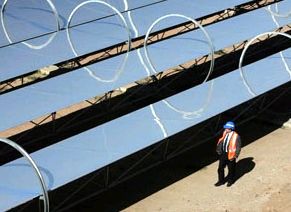 As badly as the rest of the business world seems to be doing, renewable energy just keeps picking up steam. There has been a string of recent financings going to solar panel makers, financiers that help consumers and businesses buy solar installations, and now solar thermal company Ausra.
As badly as the rest of the business world seems to be doing, renewable energy just keeps picking up steam. There has been a string of recent financings going to solar panel makers, financiers that help consumers and businesses buy solar installations, and now solar thermal company Ausra.
Ausra is one of several large, heavily funded startups that use arrays of mirrors to concentrate sunlight on a central receiver containing water, which quickly reaches the boiling point to produce steam and drive a turbine. It just took $60.6 million from KERN Partners, Generation Investment Management, Starfish Ventures and founding investors Khosla Ventures and Kleiner Perkins Caufield & Byers.
The company last year signed a deal with Pacific Gas & Electric for a 177-megawatt plant in San Luis Obispo County, Calif., and also began construction on a production facility near Las Vegas that is now churning out components like Ausra’s cheap, flat mirrors, which are called Fresnel reflectors.
Those mirrors are cheaper than the curved heliostats other companies use, as are some of Ausra’s other components. Chief executive Bob Fishman says those are some of the factors that will make Ausra the first solar thermal startup to plug a full-scale electricity generation plant into the grid (in the middle of next year), although Ausra’s plans are far outsized by Brightsource’s contract for 900 megawatts of thermal solar.
Given the current banking problems, I also interviewed Fishman to ask about how the credit crunch will impact large-scale renewable energy.
VB: You just took an equity funding. Will the credit crunch affect project financing — that is, bank and private equity loans to build large, utility-scale plants?
BF: In general, project debt is done on the merits of the individual project. That’s what determines whether you can get it. And you’re going to see people willing to put money into things they perceive as having a lot of long-term value.
As part of our market we also have the ability to just sell steam to industrial customers, who are looking at it as a way to save energy. There are a variety of ways we take our product to market, whether as electricity, steam or an augmentation to an existing power project.
VB: Your investors have pointed out rising materials costs, for steel, glass and so forth, as a challenge. How are those affecting Ausra’s plans?
BF: If steel goes up, the cost of our facilities go up. But the cost of a coal or gas plant goes up even more. If we’ve already signed a contract, we have to absorb the cost, but we take measures to accommodate that. But one of the few advantages to the crisis right now is that it’s actually weakening commodity prices.
VB: As a former natural gas plant operator, what do you predict happening to the costs of non-renewable fuels and energy?
BF: I think we’re already at parity with natural gas. There are other options, but if you want to talk about California, if you need power in four to five years, nuclear is 10 years off for the first plant. Clean coal doesn’t exist yet, so let’s also call that 10 years. What you have left to do, in the United States at least, is natural gas and renewables. Right now, we’re at par with natural gas, and as energy prices increase, I think it will pass us [in price]. I think what you’ll see getting built in California for the next 4-5 years is gas-fired plants and solar thermal.
VB: Are environmentalists still raising objections to the amount of land used by solar thermal plants? What about water?
BF: With respect to land use, we’re the most land-efficient solar technology there is. We use half the land that Brightsource uses, and a quarter of what solar PV uses. In terms of disturbing the land, if you look at our stuff, we have small foundations on the ground and the mirrors are about eight feet up. And this is a facility that uses almost nothing that’s remotely toxic. It’s glass, steel and water, and we recycle all the water. There are always people who oppose anything, but people have to get their mind around it. If you want energy, there are choices. Unless you want to sit in the dark.

